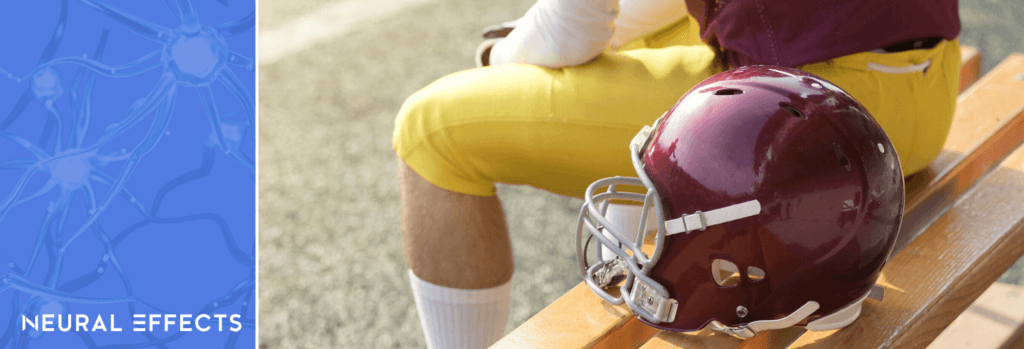For most people, concussion symptoms only last a few days or weeks after the initial injury. But up to 30% of patients can have lingering symptoms that last months or even years.
For a long time, the standard concussion treatment was to stay in a dark room with minimal stimulation until symptoms disappeared (a method called “cocooning”). This was certainly easy to follow, but researchers have since shown that this method can increase symptoms and delay recovery. You’re more likely to make a full recovery with therapy that includes sub-symptom threshold exercise (i.e., exercise that might provoke symptoms slightly but that is still tolerable during recovery).
Therefore, recent guidelines promote an active approach to recovery in which patients start exercising and gradually return to normal activities only a few days after the concussion. If followed correctly, this approach can speed up recovery (compared to cocooning). The problem is that this regimen is less easy to follow.
In practical terms, when you’re ready to return to your normal activities, you must be prepared to experience some symptoms when you exercise or do some complex cognitive tasks. However, there’s also a danger of trying to do too much, which can be detrimental to your brain and slow down recovery.
In this article, we answer common questions regarding how long concussion recovery takes and what you can do to speed up recovery times, including:
- How long concussion recovery typically takes
- Risk factors for longer concussion recovery times
- Why post-concussion therapy helps & what it involves
- Tips for navigating concussion symptoms at home
If you live in Provo, Salt Lake City, or anywhere else in the Utah Valley area, we can help you recover from your concussion and reduce your chance of long-term symptoms. We are in-network for most types of medical insurance. Schedule your evaluation today.
The Average Recovery Timeline
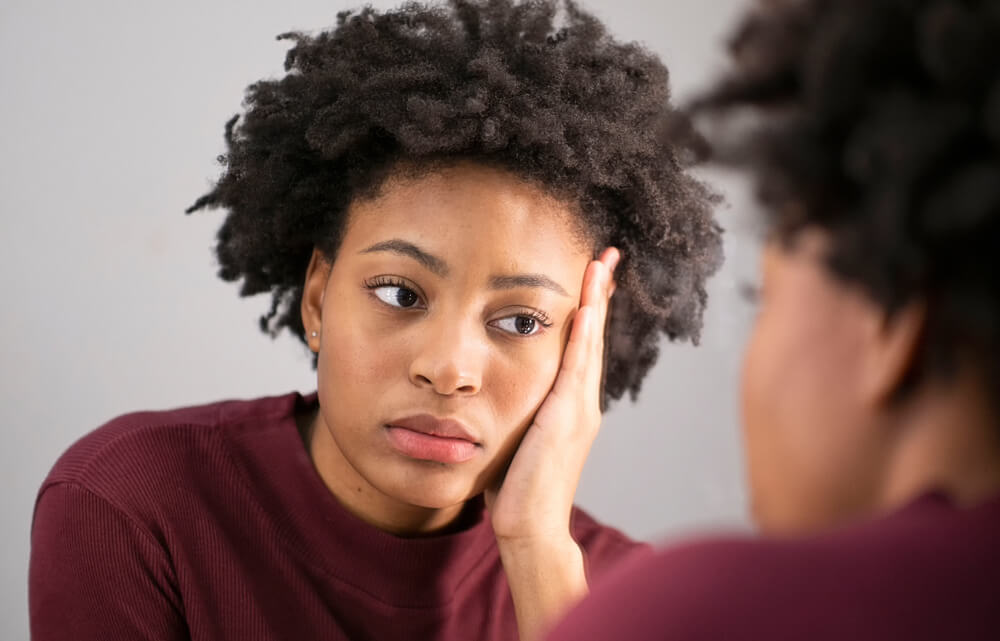
On average, most people fully recover from a concussion within 4 weeks, with some recovering in 7-10 days. Some common symptoms during this period include nausea, headaches, memory problems, mood changes, issues with vision and balance, and fatigue.
Further reading: What to do for concussion symptoms
If your symptoms last longer than three weeks, you may have developed a condition called post-concussion syndrome (PCS). Some patients continue to experience symptoms of a concussion for months or even years. Researchers don’t know exactly why up to 30% of concussed patients develop PCS. Developing PCS doesn’t appear to be related to the severity of the initial injury.
In the first few weeks following your traumatic brain injury (TBI), treatment at a concussion clinic can help you overcome symptoms quickly and increase your chances of a full recovery. But if it’s been more than three months and you’re still experiencing symptoms, you may need medical care from a clinic, like Cognitive FX, that specializes in treating persistent post-concussion symptoms.
What Can Make Concussion Recovery Take Longer

Each concussion is different; the path to recovery will also be different for each patient. Some patients only experience mild symptoms and recover very quickly, while others have more severe symptoms and take longer to recover. In addition, not all concussion symptoms will be noticeable right after the injury. Some might not appear until days or weeks later, confusing patients who thought they’d recovered.
It’s not surprising that experiencing more severe symptoms at the time of the injury is likely to cause a longer recovery time, but there are other factors that may prolong recovery:
Age
Age is one of the most studied factors that may affect recovery after a mild traumatic brain injury. There is some evidence to support the idea that children and adolescents are more vulnerable to the effects of a concussion than adults. For example, a study found that college students recovered faster after a concussion than high school pupils. The authors suggested that children are more likely to suffer diffuse swelling in the brain, which could cause the delayed recovery in younger patients.
Pre-existing mental health disorders
Pre-existing mental health conditions, such as depression and ADHD, have been identified as risk factors for persistent symptoms in a small number of studies.
Headaches and migraines
Headaches are a common symptom after a concussion, but they usually clear within a few days. However, patients experiencing migraines (which are often accompanied by light and/or sound sensitivity, nausea, and vomiting) not only have more severe cognitive problems but also need longer to recover. Patients with a history of migraines may have a higher risk of a prolonged recovery, but more research is needed to definitively establish this association.
Gender
Research examining gender differences is still limited, but females seem to take longer to recover after a concussion. This may seem counterintuitive as both estrogen and progesterone have neuroprotective functions. Some studies have suggested that long-term symptoms are more likely to happen if the injury occurs during the luteal phase of the menstrual cycle, potentially due to an abrupt drop in estrogen and changing progesterone levels. You can read more here about how a brain injury affects women.
Prior concussions
It’s a common idea that patients with prior concussions experience more symptoms and need a longer recovery period. While several studies have found this association, a number of studies failed to detect differences between patients with only one concussion and those with repeated injuries. While concussion history alone is not a reliable predictor of clinical recovery, each consecutive concussion still comes with a risk of developing post-concussion syndrome.
Loss of consciousness and amnesia after the concussion
There is a long-standing interest in whether factors such as loss of consciousness and post-traumatic amnesia are related to a longer recovery period. This would be an easy way to identify which patients need long-term care after a concussion if a connection could be made. However, only a limited number of studies have reported that loss of consciousness and/or amnesia after the concussion is associated with a longer recovery rate. In contrast, most studies found instead that the severity of symptoms after the concussion is a better predictor of slower recovery.
Concussion Recovery is Faster with the Right Treatment
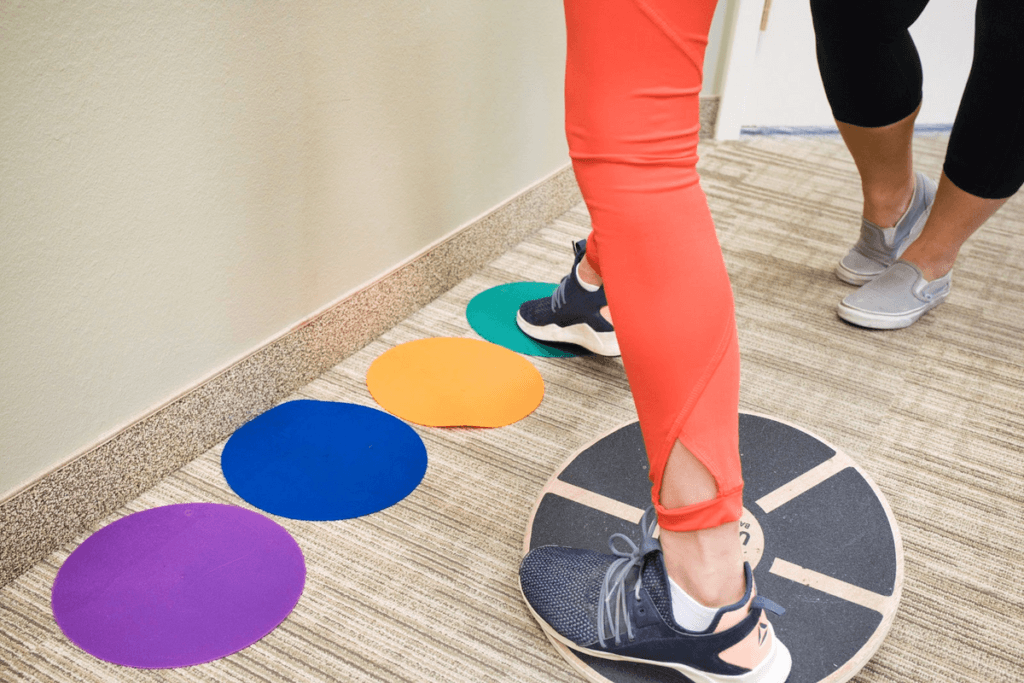
For a long time, medical advice after a concussion involved staying in a dark room with minimal stimulation until all the symptoms disappeared. This included not using computers, mobile phones, and game consoles, as well as avoiding physical activity. The idea was to reduce the demands on the brain when it was vulnerable. This approach — called cocooning — grew out of the real concern that a second concussion would be devastating and cause serious brain damage.
However, researchers have shown that cocooning does not address symptoms and can even delay recovery. For example, a study showed that patients who followed a strict rest period for five days after the concussion had more symptoms and a longer recovery period than patients who only had one or two days of rest followed by a gradual return to normal activities.
Instead of prolonged rest, active rehabilitation is the best option to maximize recovery after a concussion. Studies show that this approach improves your chances of a full recovery and reduces the risk of long-term symptoms.This is the approach we use at Neural Effects (more on that later).
That said, some rest after a concussion is important. Healthcare professionals now recommend rest from both physical and mental activity for 48 hours after a head injury. Limiting screen time, loud noises, bright lights, and other overwhelming stimuli during this period helps the brain begin the process of healing.
During those first 48 hours, it’s good to avoid…
- Driving
- Watching television
- Playing video games
- Listening to loud music
- Reading a book
- Doing household chores
- Exercising
- Lifting heavy objects
During the first 24 hours, avoid taking medication that increases the risk of bleeding. That includes, for example, aspirin and ibuprofen (Advil). If you need over-the-counter pain medicine, use acetaminophen (Tylenol) instead. After the first 24 hours, the risk of bleeding decreases and it’s safe to take other medications again. You may also want medication for nausea and vomiting, but don’t start taking it without consulting a physician.
After this initial 48-hour period, you can gradually increase your activity levels, including screen time and physical exercise. Many websites will advise you to take it very slow and try to do just a little bit at a time, and only increase activity levels if you feel comfortable. For example, the Centers for Disease Control and Prevention (CDC) HEADS UP program recommends that student-athletes return to school before resuming light exercise.
At Neural Effects, we believe this method is still flawed, based on current research. While it may be better than cocooning, it still doesn’t give your brain the boost it needs for neuroplasticity (which is how your brain recovers after an injury). Instead, activities and exercise that trigger your symptoms are okay as long as the increase in symptoms isn’t severe.
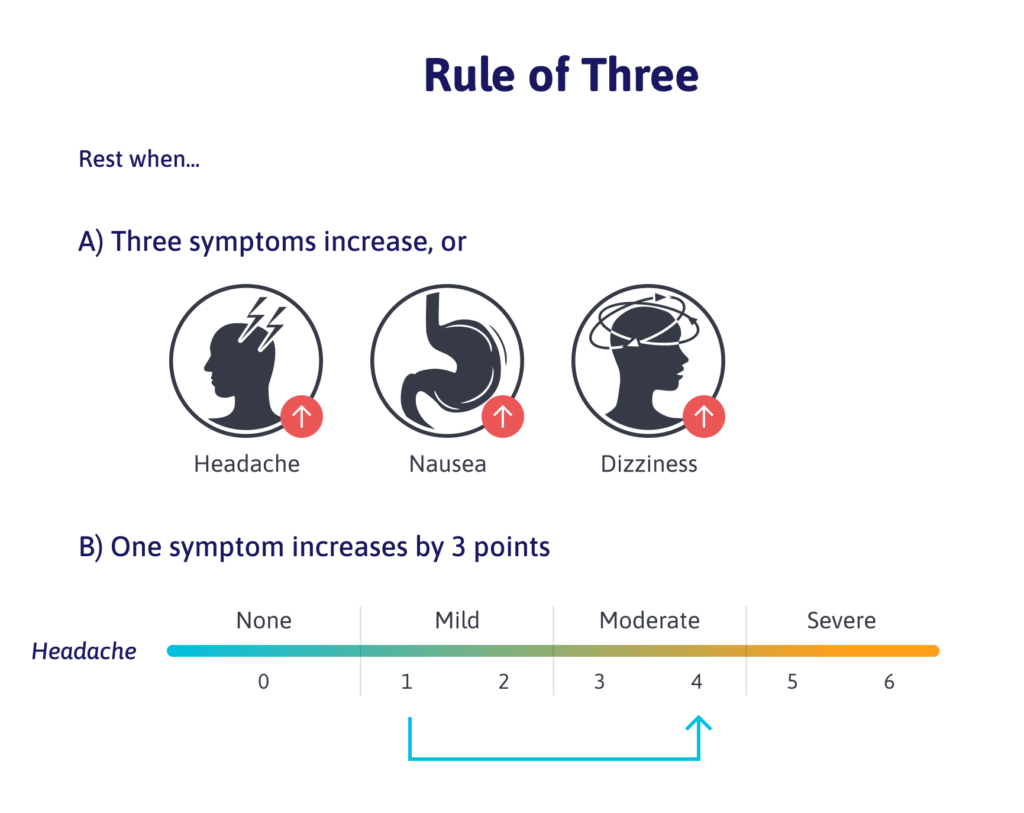
In practical terms, only stop an activity if you’ve noticed three symptoms are getting worse because of it. For example, if you develop dizziness, nausea, and a headache during an activity, it’s time to take a break and let your symptoms settle. You should also stop if one symptom is worsening quickly. For example, if your headache goes from what you would rate as a 1 (very mild) to a 4 (medium) on a 1 to 6-point severity scale, then it’s time to stop. In contrast, if you only experience a mild increase in one or two symptoms, then it’s okay to continue.
For patients, finding this balance can be tricky:
- If you do too much, you run the risk of overexerting yourself, which may delay recovery. For example, a study found that high school athletes engaging in excessive levels of activity after concussion performed worse on neurocognitive testing than those who maintained moderate levels.
- If you don’t do enough, your brain might recover more slowly (or not at all, in the case of patients who develop PCS).
It’s much easier to find the right balance during recovery when you work with therapists trained in concussion treatment.
Concussion specialists can determine how the concussion affected your body’s systems and direct your treatment accordingly. Many patients will have to reach out to these providers directly; if you sought medical attention in the emergency room, for example, it’s likely you were sent home without plans for follow-up.
Concussion Treatment at Neural Effects
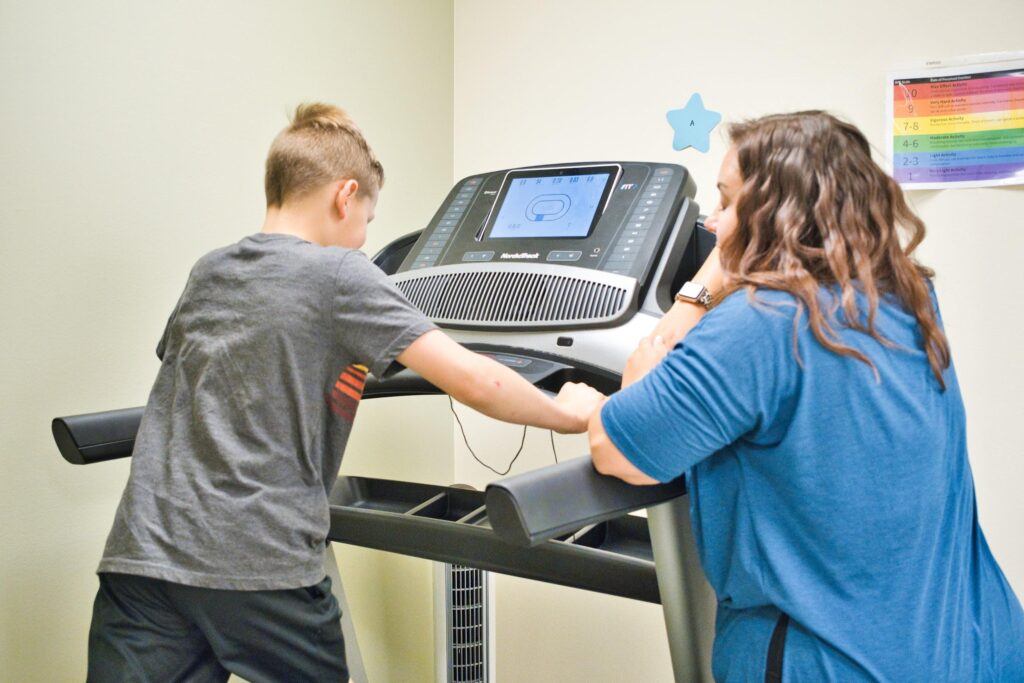
At our concussion clinic, Neural Effects, all patients undergo a detailed evaluation before starting therapy. During your first meeting, one of our therapists will ask you to list your symptoms and then rate them from zero (no symptoms) to six (severe symptoms).
During this meeting, we also review your medical history and decide if we need to order a CT scan or an MRI scan to rule out bleeding in the brain or a skull fracture. If you already had these scans at the hospital, bring them along with you and we can assess them as part of your medical history.
After this meeting, we’ll conduct a series of physical exams, including…
- A cranial nerve exam to detect if any cranial nerves were affected by the concussion.
- A cervical spine exam to check for abnormalities indicative of fracture or a herniated disc.
- A balance assessment to identify balance and posture issues.
- A vision assessment to assess your peripheral vision, depth perception, ability to focus, and other parameters.
- A muscle strength assessment to check if both sides of the body have the same strength. (Differences between left and right side could indicate a serious injury.)
After these exams, our team assesses your results, and then you can start your treatment. Usually, patients attend three sessions a week for two weeks, but this schedule can be adjusted according to each patient’s needs.
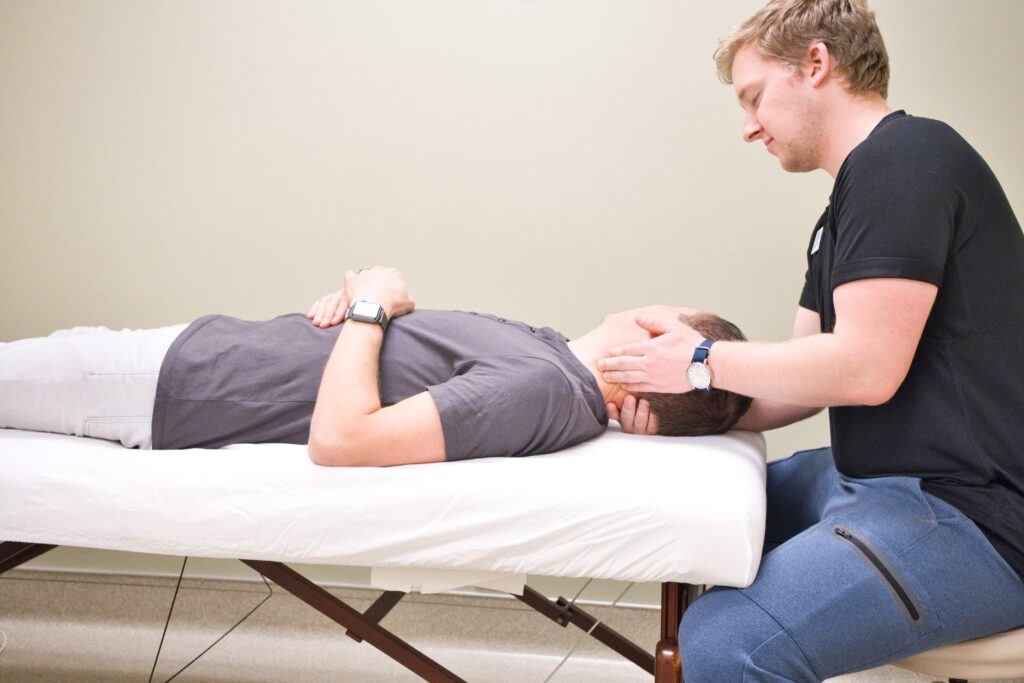
We use a variety of different therapies, including neuromuscular therapy, vision therapy, cognitive therapy, and physical therapy. Our therapists are trained to ensure that the sessions are challenging enough to promote brain healing but not so difficult that they trigger a serious spike in symptoms.
Physical exercise, for example, is usually done on a treadmill or a stationary bike. The aim is to raise your heart rate to promote healthier blood flow in the brain but without aggravating any exercise intolerance symptoms you may have.
We also address symptoms such as vision problems, light sensitivity, dizziness, and vertigo with vestibular and vision therapy.
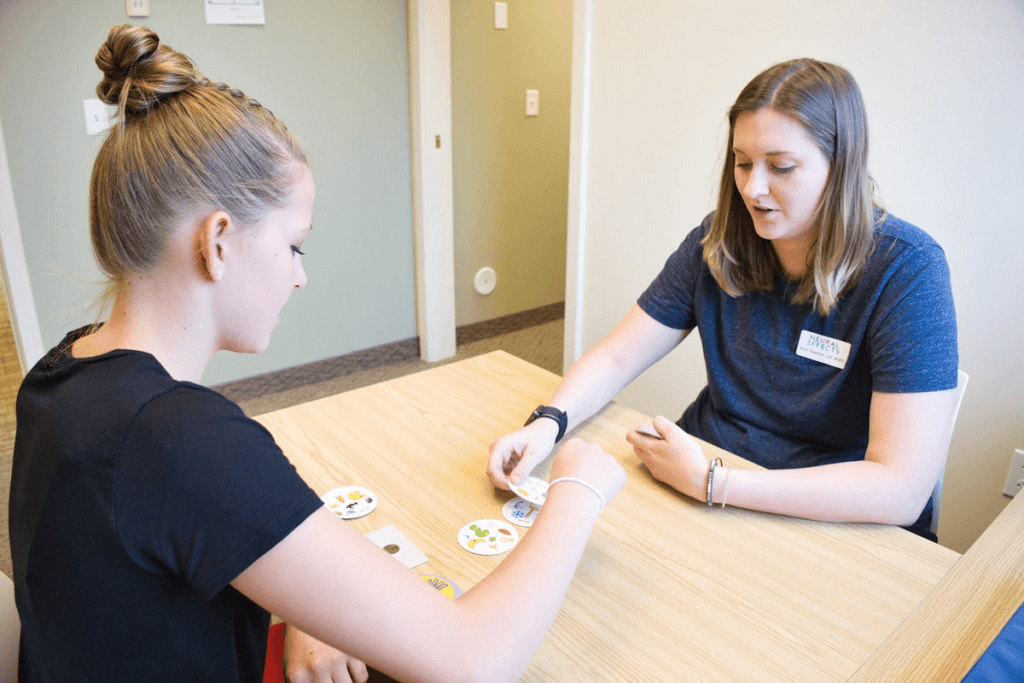
During cognitive therapy, patients complete logic puzzles and memory exercises to help resolve symptoms like memory issues, brain fog, and difficulty concentrating.
The final type of therapy is neuromuscular therapy. This involves massaging your neck and upper back to relieve tension, reduce headaches, and improve blood flow to the brain.
After each therapy session, our therapists will give you a list of resources to continue your recovery process at home. It typically includes instructions for physical exercise, cognitive exercise, and breathing and relaxation techniques. Faithfully continuing these therapy exercises at home gives you a better chance of a full recovery.
If you live in Provo, Salt Lake City, or anywhere else in the Utah Valley area, we can help you recover from your concussion and reduce your chance of long-term symptoms. We are in-network for most types of medical insurance. Schedule your evaluation today.
Ways to Boost Concussion Recovery at Home

In this section, we’ll cover some general recovery best practices, along with strategies for the following common concussion symptoms:
- Sleep problems
- Headaches
- Fatigue
- Dizziness
- Vision problems
- Sensitivity to noise
- Cognitive problems
- Emotional problems
General advice
- Avoid activities that could lead to another hit to your head: It is very dangerous to suffer a second concussion while you’re still recovering from the first. This includes, for example, contact sports or dangerous professional activities.
- Avoid alcohol: Do not drink alcohol within a week or two after suffering a concussion. Concussions can affect your metabolism and your brain might not react to alcohol the way it normally does. You can read more here about the effect of alcohol and caffeine on an injured brain.
- Eat a balanced diet: Consume a balanced diet that is high in protein, omega-3 fatty acids, fruits, and vegetables. Consider reducing your intake of processed foods and refined sugar.
- Exercise regularly: Engage in at least 30 minutes of exercise every day. Stationary bikes or elliptical machines are ideal for promoting blood flow to the brain without triggering a sharp increase in symptoms. Physical exercise will help a variety of symptoms, including headaches and sleep problems.
Sleep problems
Many patients complain of sleeping difficulties after a concussion. You may find that it’s hard to fall asleep or you may keep waking up during the night. But resting both your body (physical rest) and brain (mental rest) helps your brain heal. A good night’s sleep can be very helpful. To improve your chances of a good night’s sleep:
- Keep the same bedtime routine every day — even on weekends. Make sure you turn in and get up at the same time every day.
- Try not to nap during the day, as this will make it harder to fall asleep at night. If you must take a nap, limit it to 20 minutes.
- Follow a relaxing routine before bed. It could mean taking a warm bath, reading your favorite book, listening to soothing music, and so forth.
- Don’t use electronic devices in bed. Using these devices shortly before bed makes it harder for your brain to wind down and go to sleep. Use the blue light filter on your phone and consider using blue light filtering glasses if you’re at the computer.
- Avoid caffeine in the afternoon and evening, and avoid alcohol at least before bedtime (though it’s best to avoid it during your recovery).
- If needed, try taking 0.5 mg of melatonin 30 minutes before you turn off the lights. Work up to a dose that helps you sleep.
Headaches
Headaches are common after a concussion, but they often will go away after a few days. If you have a headache, try using these tips to help:
- Going outside to get some fresh air.
- Lying down and turning off the lights.
- Deep breathing and relaxation exercises.
- After your 48-hour rest period, some physical activity can actually help with headaches. Start with light activities, such as walking or swimming, then slowly increase the intensity of your exercise.
- If headaches are difficult to manage, you can take over-the-counter painkillers, including nonsteroidal anti-inflammatory drugs (Advil or Ibuprofen) or acetaminophen (Tylenol). This will not accelerate your recovery but can make the healing process easier for you to handle as long as you’re only taking these drugs short-term.
Fatigue
Fatigue is one of the most common complaints after a concussion. This is not surprising because your brain is working harder than usual, and it needs more energy than before. You can feel tired all the time or at certain times of the day, even if you feel like you’re not doing much.
Here are some tips:
- Prioritize the tasks you need to do each day. Decide what needs to be done first and solely focus on that first.
- Remember to take breaks during the day.
- Plan important activities for the time of the day when you feel most energized.
- Alternate between physical tasks, like housework, and cognitive tasks, like responding to emails. These activities use different areas of the brain and feel like a rest even though you’re still active.
- Find some fun activities that help you feel emotionally refreshed, even if you’re still physically tired.
Dizziness and lightheadedness
After a concussion, sudden movements, like getting up too quickly or turning too fast, may make you feel dizzy or lightheaded. Some patients may feel motion sickness or nausea in busy environments with bright lights or noise, such as shopping malls or movie theaters.
- Talk to your doctor about what activities are safe for you and what you should do when a dizziness attack comes on.
- There are some vestibular exercises you can do at home, including gaze stabilization and habituation exercises. You can find more information about these and other concussion therapy exercises here.
Vision problems
After a concussion, some patients notice that their eyes don’t seem to work in the same way as before. Common complaints include double or blurred vision and problems with eye-hand coordination. We recommend:
- Limiting screen time on your computer or other electronic devices. Staring in one place puts strain on your eyes and may give you headaches. Look away from the computer every now and then to rest your eyes. Many patients find the 20-20-20 rule to be helpful: Every 20 minutes, look 20 feet away for 20 seconds before resuming.
- After a concussion, you may notice that you’re especially sensitive to bright lights. Try to avoid bright fluorescent lighting for a few days while you recover.
- After your 48-hour rest period, there are some exercises you can do at home to improve your vision, including using the Brock string and tracking exercises. These exercises, even when done at home, can successfully improve many of your vision-related symptoms.
Sensitivity to noise
Some patients report being more sensitive to sound after a concussion. They struggle to go to noisy places like shops and restaurants.
- Avoiding noisy places for a few days can help, but you should gradually go back to them to allow your brain to get used to the noise.
- If it becomes unbearable and is increasing other symptoms, try earplugs to block out the sounds that you are more sensitive to.
Cognitive problems
Some patients experience changes in their cognitive skills after a concussion, making everyday tasks more difficult. Difficulties could include short-term memory loss, problems concentrating, brain fog, difficulty following a conversation, and more.
- Use a notebook to write important information down. You can also use your phone; there are many apps available to help you remember doctor’s appointments and family events. As you start to feel better, try to remember the information before you retrieve the note. Engaging your memory will help your brain recover.
- Especially during the early stages of your recovery, don’t try to do too many things at once, as you may not be able to focus on everything. You will find it easier to concentrate on one task at a time.
- Try cognitive activities such as word games or logic puzzles. Here’s a list of 17 cognitive exercises you can try at home.
Emotional problems
Concussions can affect mood and behavior in patients. You may start to feel sad, irritable, or overwhelmed on account of the physiological changes in your brain while it heals. You might also struggle to cope with the consequences of your concussion. To make things worse, psychological stressors can increase other symptoms, such as headaches, dizziness, and problems sleeping, which in turn reinforce the emotional symptoms.
- When you start to feel overwhelmed and frustrated (beyond what would normally bother you), step away from the situation and let your brain rest before returning.
- Set realistic and achievable goals with the help of your healthcare provider or psychologist.
- Remember that family and friends are there to help and support you. Don’t be afraid to ask for assistance.
- Do the things you enjoy: Go for a walk, call your friends, or watch a movie.
- Think about what causes you stress and find ways to avoid it temporarily. For example, if rush hour makes you anxious, find a different route or plan to travel at a different time.
- Learn mindfulness meditation and deep breathing exercises. This is an excellent way to cope with stressful thoughts and rest your brain.
If you live in Provo, Salt Lake City, or anywhere else in the Utah Valley area, we can help you recover from your concussion and reduce your chance of long-term symptoms. We are in-network for most types of medical insurance. Schedule your evaluation today.
